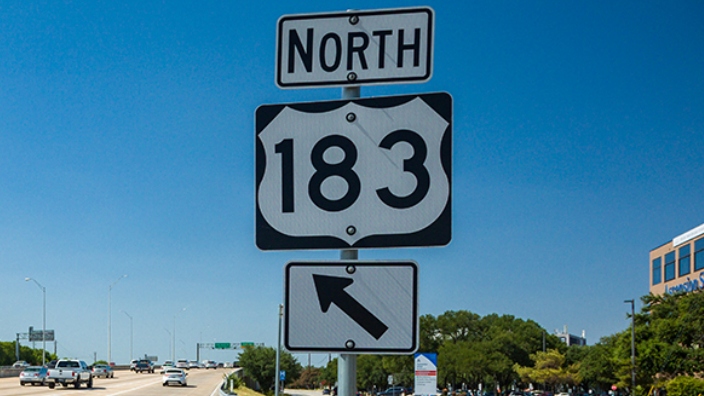Texas took part of a Black family’s farm for a highway in 1968. Now, the state’s coming back for more
The Alexander family is concerned that the expansion of U.S. 183, which spans 400 feet of their property, will destroy homes and demolish graves.
Like a number of other cities, Austin, Texas, has seized land from at least one Black family and replaced it with roads, and they are now considering taking even more from the descendants of Daniel Alexander to widen U.S. Route 183.
The Alexander land grab appears to be another example of how the government has wrongfully taken property from Black families for its own use, as has happened in the past with the oceanfront Los Angeles property of Charles and Willa Bruce in 1924 and a predominantly Black residential neighborhood displaced by a Detroit freeway during its construction in the late 1950s and early 1960s.
According to The Houston Chronicle, Alexander was a slave when he received a promise in 1847 from his owners for 73.3 acres of land located west of Austin-Bergstrom International Airport, close to an extinct underground volcano. In 1968, the Texas Department of Transportation invoked eminent domain to take a portion of the family’s farmland to construct the U.S. Route 183 highway.

The family, committed to defending what’s theirs, is upset by transportation officials’ plan to annex more farmland to relieve congestion south of Austin.
“We are a 175-year-old presence. That is our home,” said Rosalind Alexander-Kasparik, a fifth-generation Alexander descendant, who was born and raised on the farm, according to The Chronicle. “Our lives, blood, dreams and aspirations are here. These acres first acquired by (our) great-great-grandfather and his mother are our identity and legacy as well as everything around us.”
TxDOT sent a postcard in November 2019 informing the family of its intention to increase U.S. 183 from four to 12 lanes. The family spoke in favor of protecting their historic site during a Capital Area Metropolitan Planning Organization meeting in October 2020.
The family is concerned that the expansion, which will span 400 feet of their property, will destroy two historic homes, as well as demolish marked and unmarked graves of their relatives in the family cemetery, which already flooded in 2015 as a result of drainage alterations made by subdivisions surrounding the land.
According to Alexander-Kasparik, TxDOT assured them at the October 2020 meeting that the organization would take into account alternatives, such as utilizing FM 973, which is close by.
“It’s unacceptable,” Alexander-Kasparik said, noting other options, The Chronicle reported.
Diann Hodges, Southwest Texas communications director for TxDOT, said an expansion of U.S. 183 feasibility study had been put on hold for a while but has recently been restarted. Later this year, outreach to the public and in-depth research is set to begin.
The Alexander family is also worried that nearby house construction has infringed on their property, according to Alexander-Kasparik. They’ve since recruited surveyors to investigate it.
“It says a lot about tenacity, strength, agility and determination to make a life for ourselves, our heirs and our community,” said Deborah Omowale Jarmon, CEO and director of the San Antonio African American Community Archive and Museum, The Chronicle reported. “When we talk about land ownership, I don’t know how much we’re telling heirs how important it is to work the land in some sort of way, be it cattle, gardening or farming. The fight needs to be ever-present. We need to keep pushing.”
In a period when it was common to see enslaved people riding horses in the region, Daniel Alexander, who lived from 1810 to 1883, taught African Americans how to ride for work and competition. Alexander-Kasparik said the skills her ancestor imparted enabled those he trained to escape slavery on horses.
“That’s among one of the incredible findings about my great-great-grandfather,” Alexander-Kasparik told The Chronicle. “Every facet seems to show the ancestor’s perseverance; it is important to the community, city of Austin, state of Texas and the nation.”
There is also the soon-to-be Daniel Alexander Way, a name change that Alexander-Kasparik’s brother, Gerald, proposed when he noticed that developers were building all around them yet the family name was nowhere to be found.
Older relatives referred to the road as “the old road,” and five days before Juneteenth, the family and supporters gathered in front of the Travis County Commissioners Court to ask that it be renamed — a request that was ultimately granted.
“The Alexander family, its farm and cemetery mark a place, an African American cultural landscape that has persisted through slavery, Jim Crow, suburban sprawl and gentrification,” said Marcellus Winston Alexander Jr., according to The Chronicle. “It’s time the road functions as an anchor to connect our distinct Texas history, rather than divide it.”
The family will arrange a celebratory trail ride on Daniel Alexander Way in the fall. Three locations — two on the northbound side and one on the southbound side — will bear the signs.
TheGrio is FREE on your TV via Apple TV, Amazon Fire, Roku and Android TV. Also, please download theGrio mobile apps today!



